The FOSS Force Interview
Back in June I had the opportunity to meet Deb Nicholson, a person who is well known to people who frequent open source and Linux conferences.
I was dog tired, having had only about four hours sleep. I’d gotten up at about five in the morning, much earlier than I think is civilized, in order to make it to Charlotte in time for the opening ceremonies at the SouthEast LinuxFest (SELF). I’d allowed for traffic jams in the morning rush hour traffic that didn’t happen and so arrived early enough to have time to try to catch a nap on an inviting and empty couch I found in the vendor hallway that turned out to be part of the booth space for Internet Systems Consortium.
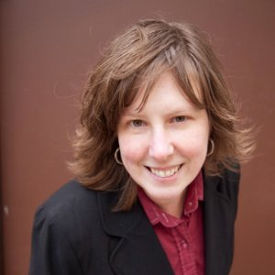
But I couldn’t, now that I knew I was intruding on someone else’s space. So I walked around in a daze, with my mind refusing to get out of first gear. My solution was to grab a cup of overpriced but halfway decent coffee being sold by the Sheraton staff, where the event was taking place, which helped some, but not enough.
At some point that morning I followed Red Hat’s Brian Proffitt into SELF’s version of a speaker/press room — which they call with southern flair a “hospitality room” — mainly because he was willing to admit that he’d read some of my work on FOSS Force, probably back when he was with Linux Today and had no choice.
The room was empty except for a couple of women I didn’t know, which wasn’t surprising since I really didn’t know anyone there. It turned out that one of the women was Deb Nicholson, who would be speaking the next day and who joined us to say hello to Proffitt, evidently an old buddy. Somehow, I confused her with Red Hat’s DeLisa Alexander — who bears absolutely no resemblance — and would’ve made something of a fool of myself with my insistence that Nicholson had spoken at last year’s All Things Open as a Red Hat representative if not for her relaxed graciousness and unassuming acceptance.
Proffitt left after only a few minutes, leaving Nicholson and me with the room to ourselves. We spent about fifteen minutes or so standing and talking about everything from politics — which we touched on only enough to satisfy us both that we’re pretty much on the same page — to privacy issues to patents. I found her to be friendly and easy to be around and took a liking to her right away.
The next afternoon I made it a point to attend her workshop on software patent litigation, which I’d already planned to attend. The presentation was informative and entertaining, and I was able to pick up a few tidbits to use in an article on the second day of the conference. After the presentation was finished, I approached her and asked if she’d be interested in doing an email interview focusing mainly on software patents, but maybe touching on some other subjects as well. She readily accepted and thanked me “for giving us this opportunity.” It should have been me thanking her because the opportunity was actually ours.
These days Nicholson is the Community Outreach Director for the Open Invention Network, a defensive patent pool put together to protect Linux and open source projects. She is also the Community Manager for GNU MediaGoblin, an open source project that strives to be a free replacement for such publishing platforms as Flickr, DeviantArt, and YouTube. She came to the free software movement about six years ago when she began working with the Free Software Foundation (FSF). Before that, she was active in Massachusetts politics.
Hall: According the brief bio about you on the Open Invention Network site, for fifteen years you were something of a political activist involved in Massachusetts state politics before you got involved with Linux and FOSS. Could you talk a little bit about that transition, what prompted it and how you ended up at FSF?
Nicholson: Organizing people around peace and social justice issues was very rewarding, but like most things worth doing, it was also frustrating sometimes. Eventually, I became interested in fixing systemic problems like campaign financing, the curtailing of civil liberties and the way the media covers (or often doesn’t cover) critical issues.
While my own priorities were shifting, the state of political discourse was going through huge changes. Activist communities were slowly moving most of our political conversations and many of our personal interactions to the web. At some point it hit me that I had no idea who built any of the tools we were all using or what that entity’s end goal was. Of course, large corporations rarely value individual freedoms unless they happen to align with their profit-driven goals.
Around that time, a friend sent me a job posting for the FSF and it just clicked. I spent the afternoon reading up on the free software movement and applied for the position immediately.
Hall: These days you seem to divide your time between the Open Invention Network, where you are Community Outreach Director, and MediaGoblin, where you are Community Manager. Since both of these jobs prominently use the words “community,” it occurs to me that you’re bringing to the FOSS table a skill set that developed out of your long involvement in politics and that, perhaps, it’s not a long road from politics to FOSS — or am I way off the mark here?
Nicholson: When I joined the FSF, they were in a state of transition. For many years, the goal had been to build a fully free operating system that anyone could install. Free distributions that didn’t require a lot of technical expertise had only just become widely available. This meant that the free software community, which was largely composed of technical people at the time, had reached a place where they needed to focus on political organizing skills to reach out to potential users and non-technical contributors. I brought lots of traditional community organizing skills to my work at the FSF; volunteer management, outreach and messaging, fundraising, strategic planning and even book-keeping. In turn, I learned an awful lot about about how programs get written.
Hall: You’re probably most well known, again these days, for your work with the Open Invention Network. I think most people are familiar with the work you do at conferences, educating and bringing the FOSS and OSS communities up-to-date on the software patent situation and how it affects Linux and open source. What else are you involved with at OIN that might not be readily apparent to those of us who only “know what we read in the newspapers?”
Nicholson: My work at OIN involves a lot of research. I read academic papers on litigation trends and try to stay on top of who’s getting sued this week. It also involves a lot of behind the scenes emailing. I have lots of informal conversations with people about how you run a free and open source software project. Sometimes, they don’t realize that lots of other companies are succeeding with FOSS business models and shared community resources. Once they see that it can be done, they often feel more confident.
Other times people contact me because they suspect there are patents on functionalities that look similar to what they’re doing and aren’t sure what to do. Sometimes, they don’t want to talk to a lawyer first because lawyers are very expensive, but if they’ve gotten a letter I recommend that they talk to one of our lawyers and also one of their own.
Hall: In the last year or two, there’s been much good news on the patent front. You pointed out at SELF that in the ’90s, about the only defenses the courts would consider were prior art or that the alleged infringement wasn’t actually covered by the patent. Last year we had what seems to have been a big win when the Supreme Court ruled against Alice Corp., resulting in the lower courts almost immediately nixing a spate of patents. Because of these perceived wins, I think a lot of people think that software patents aren’t as much a threat to open source projects as they once were. Do you think this is true?
Nicholson: The Supreme Court has given the lower courts the tools to rule against two specific categories of vague and frivolous patents. This is great for companies that have the cash and the time to go to court. For companies that don’t want to fight in court — which is lots of them, because it really is expensive and time-consuming — the letters will keep coming. Plus, there are still plenty of overly broad or obvious patents on the books that may not be affected by the recent rulings. So, things are improving but I wouldn’t say that we’re finished.
Hall: I think it was Newegg that made the decision several years back to fight all infringement threats against it in court, even if it would be cheaper to settle. I would think this would obviously have positive results for Newegg, as it’s no longer low hanging fruit, meaning the trolls might set their sites on easier pickings. Has that decision had an effect on other companies’ policies, or do you know?
Nicholson: Rackspace also famously refuses to pay trolls. And there are a few other companies that have chosen to fight rather than pay. We are starting to see more companies challenging trolls, but that is just as likely to be a result of last year’s Supreme Court rulings.
Hall: At SELF you said something I thought was very revealing, when you talked about the fact that judges who had heard more than one patent case were more likely to rule against patent holders than judges hearing their first patent cases, but that juries rule for patent holders in two thirds of the cases they hear regardless. Why do you think that juries are so predisposed to rule in the favor of the plaintiffs in these cases? Is it because they don’t understand the issues? Or is it because we Americans just like giving other people’s money away?
Nicholson: Ha! I don’t know about giving people’s money away…but if I had to guess, I’d say that the lawyers for the plaintiffs do a really good job of making the jurors identify with their clients. People like to imagine themselves as potentially wealthy one day and they don’t want patent infringers or anyone else to thwart them when they get there. I guess it’s not that much fun to identify with the underdog all the time.
Hall: You also mentioned at SELF that 40 percent of the patent infringement suits instigated by trolls are against users and not developers of software. In the case of open source software, I think this makes sense, from the patent holders perspective, as many open source projects operate on a shoestring and there’s little to be gained by suing them, while many users might be companies with deep pockets. I wonder if another reason might be that companies using a particular software might be more likely to go ahead and agree to pay to license a patent, seeing this as just the cost of doing business? I mean, many companies are already paying huge licensing fees to the likes of Microsoft and Oracle…
Nicholson: First off, this does not usually mean individual end-users. It usually means technology customers, or businesses that are merely using software or other technology. The 40 percent figure comes from Colleen Chien of Santa Clara Law School who has studied this topic in depth. Trolls do this because they don’t have customers and therefore don’t care about scaring customers off.
In my opinion, users (as opposed to builders) of software are much less likely to be able to understand the claim and determine whether or not there’s anything significant being asserted. Plus, this tactic of suing the user is probably being employed with a fairly low settlement ask. Lots of low settlements add up. This tactic was infamously employed by a well-known NPE [non-practicing entity], called MPHJ in both Vermont and New York.
Hall: The Open Invention Network, which was founded in 2005 by a group of large tech firms that use OSS extensively if not exclusively, is basically a patent pool that all members can use as something of a weapon against patent threats. How effective do you think this has been in protecting open source projects?
Nicholson: Since 2005, OIN has grown to over 1,600 participants and over 2,300 covered software packages. I think we’ve changed the assumptions companies and individuals have around their approach to patents. Just a few years ago, it seemed to many like competition at any cost was the only financially sound option. These days, we see companies finding value in a collaborative approach to patents. Even companies that aren’t exclusively FOSS companies are embracing our non-aggression pact and I think it’s helping to make strategic cooperation feel more normal.
Hall: Is there anything that Gary Newell’s “everyday Linux user,” those who rely on Linux and open source software at home but aren’t necessarily involved in tech in a business sense, can do to help in the struggle to reduce the threat that software patents pose to open source?
Nicholson: Just reading the news and staying informed is a huge help. It wasn’t so long ago that when you’d mention software patent suits, people would immediately imagine two large, multi-national companies duking it out for unfathomable sums of money in court. We know this issue also impacts small and medium sized companies, as well as what is made available to the end-user. There’s a lot of conflicting information out there — some from very deep pockets — so make sure you know where your information is coming from. There are currently several different types of reform being discussed by various states and countries, so you may have a chance to let your representatives know how you feel about software patents and how important free and open source software is to you.
Hall: Finally, bring out your crystal ball and say something about what you think the future holds on the patent front.
Nicholson: Anytime we’ve had a huge technological leap forward, there’s been an argument over how to control it and who deserves to benefit. It happened with steam technologies, farm implements and airplanes. Software is no different in that regard. I personally hope we get to a place where all software is free and innovation is unfettered. Maybe we’ll even take notes on how we did it this time? Otherwise, we’ll have the same conversations all over again for printable genes, artificial intelligence or whatever comes after that.
Help keep FOSS Force strong. If you like this article, become a subscriber.
Christine Hall has been a journalist since 1971. In 2001, she began writing a weekly consumer computer column and started covering Linux and FOSS in 2002 after making the switch to GNU/Linux. Follow her on Twitter: @BrideOfLinux







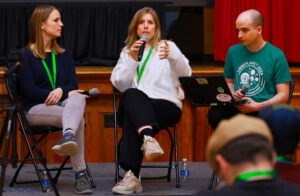
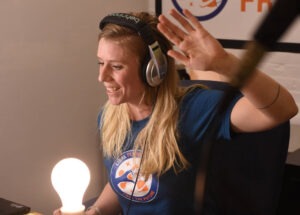
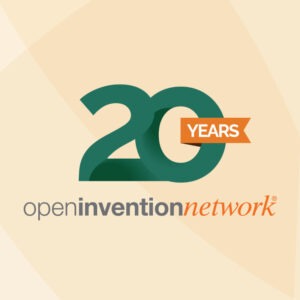
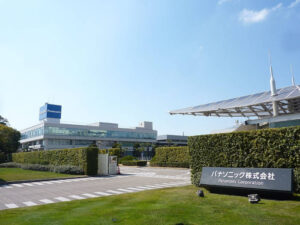
Wow, she’s really beautiful! And smart! 🙂